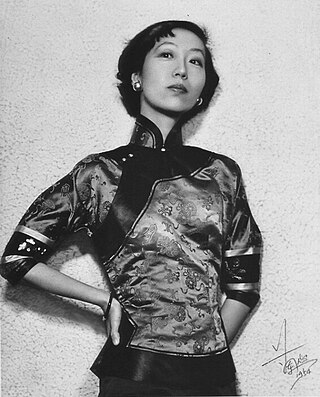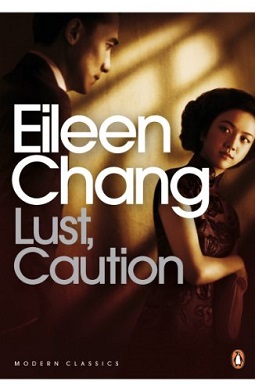| The Sing-song Girls of Shanghai | |||||||||||||
|---|---|---|---|---|---|---|---|---|---|---|---|---|---|
| Traditional Chinese | 海上花列傳 | ||||||||||||
| Simplified Chinese | 海上花列传 | ||||||||||||
| |||||||||||||
The Sing-song Girls of Shanghai,also translated as Shanghai Flowers [1] or Biographies of Flowers by the Seashore, [2] is an 1892 novel by Han Bangqing. [2]
The novel,the first such novel to be serially published, [2] chronicles lives of prostitutes in Shanghai in the late 19th century. [1] Unlike most prostitution-oriented novels in Wu Chinese,specifically the Suzhou dialect,all dialog in this novel is in Wu. [3] [4]
The writer Eileen Chang translated the book into Mandarin,published in two parts under the titles "海上花開" and "海上花落" (lit. The Flowers of the Sea Bloom / Fade" or "The Flowers of Shanghai Bloom / Fade"). She also translated the book into English, [5] which was not discovered until after her death. [6] Eva Hung revised and edited the English translation before its publication.
Wilt L. Idema,who wrote a book review of The Chinese Novel at the Turn of the Century in T'oung Pao ,wrote that the novel Shanghai Flowers included the use of Wu in dialogs,a "doomed to failure" protagonist,and a consciously crafted plot,therefore the book "already showed many of the characteristics of a typical Late Ch'ing novel". [2]
A film adaptation called Flowers of Shanghai was made in 1998. [6]
Hu Shih,Lu Xun,and other Chinese literary figures critically acclaimed Shanghai Flowers. However,the novel did not sell very well. [3] Lesley Downer of The New York Times wrote that few people read the novel in China as of 2005. [6]
Hu Shih's thesis is that because the novel had such a strong usage of Wu,readers had difficulty understanding it. [3] Donald B. Snow,author of Cantonese as Written Language:The Growth of a Written Chinese Vernacular,wrote that generally the sales of other novels outperformed Shanghai Flowers because their limited usage of the Wu made them easier to read. [3] David Der-wei Wang argued that the main usage of Wu in the novel was only by the prostitute characters and therefore the original novel would be fairly understood by other Chinese speakers. Wang concluded that the language would not be the reason for the novel's continued unpopularity since Chang had written her Mandarin translation. Instead,Wang argued that Han Bangqing's "matter-of-fact" way of describing things,which opposes opulent descriptions of events and food;and the general lack of sensationalism and "sentimental narcissism" contribute to "the fact that it does not read like the prostitute novel we generally know." [5] [7]

Eileen Chang (traditional Chinese: 張愛玲; simplified Chinese: 张爱玲; pinyin: Zhāng Àilíng; Wade–Giles: Chang1 Ai4-ling2;September 30, 1920 – September 8, 1995), also known as Chang Ai-ling or Zhang Ailing, or by her pen name Liang Jing (梁京), was a Chinese-born American essayist, novelist, and screenwriter.
The history of Chinese literature extends thousands of years, and begins with the earliest recorded inscriptions, court archives, building to the major works of philosophy and history written during the Axial Age. The Han and Tang dynasties were considered golden ages of poetry, while the Song (960–1279) and Yuan (1271–1368) were notable for their lyrics (ci), essays, dramas, and plays. During the Ming and Qing, mature novels were written in written vernacular Chinese, an evolution from the preeminence of Literary Chinese patterned off the language of the Chinese classics. The introduction of widespread woodblock printing during the Tang and the invention of movable type printing by Bi Sheng (990–1051) during the Song rapidly spread written knowledge throughout China. Around the turn of the 20th century, the author Lu Xun (1881–1936) is considered an influential voice of vernacular Chinese literature.

Wang Wei was a Chinese musician, painter, poet, and politician of the middle Tang dynasty. He is regarded as one of the most distinguished men of arts and letters of his era. About 400 of his poems survived and 29 of them are included in the 18th-century anthology Three Hundred Tang Poems. A large portion of his finest poems drew inspirations from the local landscape.

Flowers of Shanghai is a 1998 Taiwanese drama film directed by Hou Hsiao-hsien. It is based on the novel The Sing-song Girls of Shanghai (1892) by Han Bangqing, which was originally written in the Wu language (吳語) and translated into Mandarin Chinese by Eileen Chang. The film stars Tony Leung as a wealthy patron and Michiko Hada, Annie Shizuka Inoh, Shuan Fang, Jack Kao, Carina Lau, Rebecca Pan, Michelle Reis and Vicky Wei as "flower girls" in four high-end Shanghai brothels. It was voted the third best film of the 1990s in the Village Voice Film Poll conducted in 1999. The film was selected as the Taiwanese entry for the Best Foreign Language Film at the 71st Academy Awards.
Sing-song girls, also known as flower girls, is an English-language term for the high class prostitutes in China during the 19th century.

Lust, Caution is a novella by the Chinese writer Eileen Chang, first published in 1979. It is set in Shanghai and Hong Kong during the Second Sino-Japanese War. Reportedly, the short story "took Chang more than two decades to complete". The 2007 film of the same name by renowned Taiwanese director Ang Lee was an adaptation of this novel. The story focuses on the plight of Wang Chia-chih and her involvement in a plot to assassinate Mr. Yee, who is a co-collaborator of a Chinese collaborator with the invading Japanese force. The novella was allegedly based on a true story of the wartime spy Zheng Pingru. According to David Der-wei Wang, Lust, Caution “drew controversy thanks to a biographical subtext: it seems to project Chang's own wartime experience as a collaborator's lover”.
Belinda Chang is a Chinese-language author from Taiwan. She graduated from National Taiwan University's Chinese department, and went on to earn a master's degree in performance culture from New York University. After living in the United States for thirteen years, she later relocated to Beijing and then Shanghai.
Hsia Chih-tsing, or C. T. Hsia, was a Chinese historian and literary theorist. He contributed to the introduction of modern Chinese literature to the Western world by promoting the works of once marginalized writers in the 1960s. Today, C. T. Hsia is considered one of the most important critics of Chinese literature.

The Heaven Sword and Dragon Saber is a Chinese television series adapted from Louis Cha's novel of the same title. It is a final instalment of a television trilogy produced by Zhang Jizhong, preceded by The Legend of the Condor Heroes (2003) and The Return of the Condor Heroes (2006). Unlike the previous adaptations, this remake is the first to be primarily based on the third edition of the novel. The series was first broadcast on Wenzhou TV in China in October 2009.
Chinese Film Performance Art Academy, founded in January 1985, is a professional organization of Chinese actors.
Wilt L. Idema is a Dutch scholar and Sinologist who taught at University of Leiden and Harvard University (2000–13), presently emeritus at both universities. He specializes in Chinese literature, with interests in early Chinese drama, Chinese women's literature of the premodern period, Chinese popular narrative ballads, and early development of Chinese vernacular fiction.
The Nine-tailed Turtle is a novel by Zhang Chunfan (?-1935), an author from Piling. The novel centres around the life of a scholar named Zhang Qiugu, who leaves his wife to spend time with famous courtesans in China's pleasure districts.

Bizarre Happenings Eyewitnessed over Two Decades is a novel by Wu Jianren. The novel was serialized in Xin Xiaoshuo, a magazine by Liang Qichao. In 1909 the novel was completed and published in book form.

A Flower in a Sinful Sea is a novel by Jin Tianhe and Zeng Pu. First published in serial installments beginning in 1904, the work is a roman à clef. The work was partially translated to English by Rafe de Crespigny and Liu Ts'un-yan in 1982. It was also translated to French and Russian.
Zeng Pu was a Chinese novelist.
Han Bangqing, also known by the given name Ji (寄), courtesy name Ziyun (子雲), and pseudonyms Taixian (太仙), Dayi Shanren (大一山人), Hua Ye Lian Nong (花也憐儂), and Sanqing (三慶), was a late-Qing dynasty Chinese writer from Lou County, Songjiang Prefecture, Jiangsu.

The Golden Cangue (金鎖記) is a 1943 Chinese novella by Eileen Chang. The author's own English translation appeared in the anthology Modern Chinese Stories and Novellas: 1919–1949 (1981) published by Columbia University Press. Fu Lei was an enthusiastic critic of the story, while C. T. Hsia considered it "the greatest novelette in the history of Chinese literature". Later the story was rewritten as the novel The Rouge of the North (怨女).

Long Live the Missus! is a 1947 Chinese romantic comedy film known as one of the best comedies of the civil war era. The film was directed by Sang Hu with a screenplay written by the famous Chinese literary figure Eileen Chang; the pair also collaborated on the 1947 film Unending Love. The film was produced in Shanghai by the Wenhua Film Company. Long Live the Missus! offers a satirical depiction of the lives of women, male-female relationships, and the institution of marriage in 1940s Shanghai.
Red Rose, White Rose, is a novella by Eileen Chang, one of the most well-known authors in modern Chinese literature. The novel was first published in 1944 and later included in her short-story collection Chuanqi. In 1994, Hong Kong director Stanley Kwan adapted the novel into a movie of the same name Red Rose White Rose, which was widely acclaimed and entered into the 45th Berlin International Film Festival.